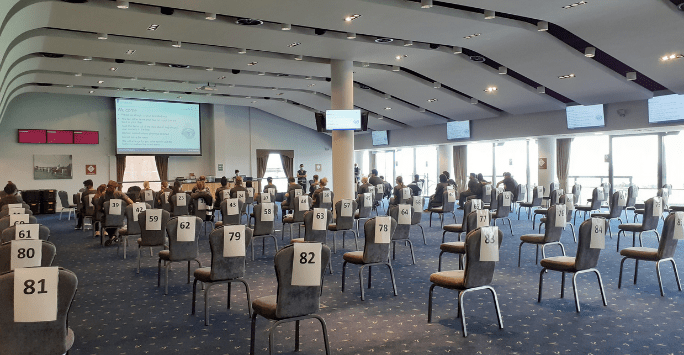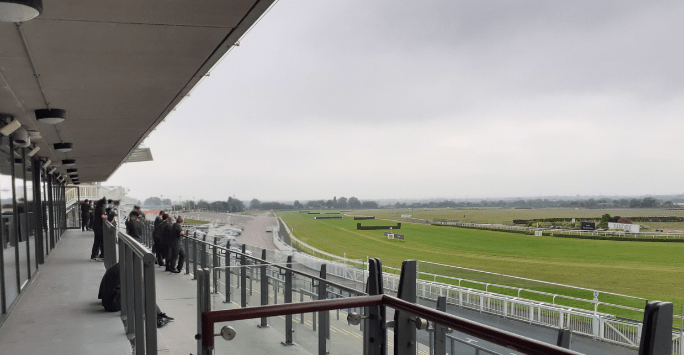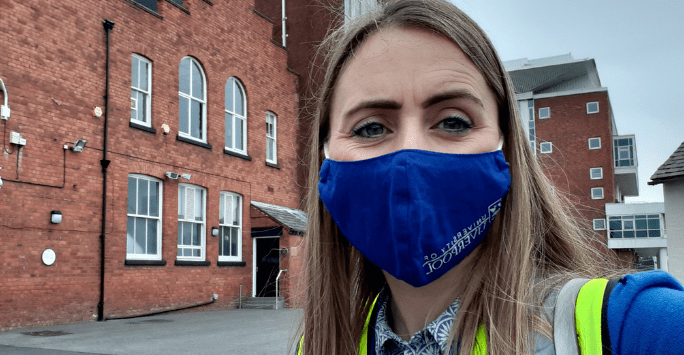
Liverpool School of Medicine once again took over Aintree Racecourse this summer to pull off the quite astounding feat of running clinical assessments for over 800 student doctors, bringing together their clinical and communication learning from the academic year.
Involving more than 1900 examiners, 250 simulated patients and 200 crates of clinical and technical equipment, these assessments truly have to be seen to be believed. Painstakingly set up by the School’s 20-strong Clinical Skills team, the clinical stations lined three floors of the Princess Royal Stand and brought to life clinical scenarios where students could put their skills to the test.
Clinical assessments in numbers
- 802 students
- 1908 examiners
- 253 simulated patients
- 354 student liaison officers
- 22 Clinical Skills staff
- 47 School of Medicine support staff
- 200 crates of clinical equipment
- 160 iPads
- 40 walkie talkies
- 546 exam set ups
- 1160 minutes of Zoom huddles
- 9136 cups of coffee
- 38 hours to set up (and take down!) the stations
Clinicians from NHS trust sites and practices across Merseyside and beyond stepped into the role of examiner to oversee student performance as they interacted with models and simulated patients both in person and acting over Zoom.
 L-R Examiners Susanna Brockbank, Pippa Friday & Josh Campbell take in the view over coffee
L-R Examiners Susanna Brockbank, Pippa Friday & Josh Campbell take in the view over coffee
James Glendinning, a Urologist at Arrowe Park Hospital was one of the team of examiners at Aintree this year and enjoyed the variety of stations he was involved in, both close to and very different from his own specialty.
“The scenario I was supervising one afternoon really put the student’s communication skills to the test."
What I particularly liked about this scenario was the opportunity for dual feedback, both from myself and from the simulated patient who was interacting with the student over Zoom.
Students arrived at the racecourse by coach and were welcomed by Director of Clinical Skills, Simulation and OSCE Helen Box for a briefing before completing the circuits in 90-minute slots. Confidentiality around assessment content is key and students are provided with a notebook to take notes, with all other possessions secured before they begin.
 Students take part in a briefing ahead of beginning the assessment
Students take part in a briefing ahead of beginning the assessment
At each circuit students have 3 minutes to read instructions and familiarise themselves with the clinical exam station and then 10 minutes to work on the skill and complete the station.
Student liaison officers are on hand to guide students through the circuits and announcements played over a loudspeaker let the students know when it is time to move on to the next step. Previously a simple ‘bing bong’, it is now the friendly voice of Clinical Skills Lecturer Natalie Harrington.
Bee Collier, Director of Assessment and Feedback, is incredibly proud of all of the hard work that various teams put into the assessments, particularly the Clinical Skills department.
“This is a perfect example of how so many parts of the School come together to produce such a high quality clinical assessment. Starting way back in the year, when academic teams work with the station development team to produces realistic clinical encounters, through to the day-today running of such a massive event over 5 weeks and the end point of results and student feedback and everything in between."
We often say a military operation and it is, many students don’t realise the work that goes in until they return as an examiner in future years and get to see much more of what happens behind the scenes.
Those clinicians taking on the role of examiner get to know their station by reading through the scenario first on individual iPads and then taking part in a virtual huddle led by a member of the Clinical Skills team ahead of the session.
Rebecca Hamm, Consultant Urologist and Urinary and Renal System Lead at the University of Liverpool, was one of the examiners in action.
“As a system lead and clinical educator, I get satisfaction from examining stations that I have helped to develop and see how they work under exam conditions but I also enjoy examining stations that are out of my normal sphere of expertise and I always learn something new."
It was great to be back at Aintree! I really enjoy seeing how the students grow in confidence and expertise as they go up the years.
"The OSCE team are amazing. They put so much time and effort into making things as fair as possible for students and as easy as possible for examiners. All supported by convincing simulated patients. I certainly prefer it to a day at the races!”
 Students chat on a viewing platform ahead of the assessment.
Students chat on a viewing platform ahead of the assessment.
Quality Assurance is evident at all levels and in all aspects. Checks are carried out at stations to compare scenarios across rounds and ensure consistency. Examiners, students and simulated patients have a number of different avenues to share feedback and ideas, with tweaks made on the fly to deliver the highest quality standards.
Brian Tubb, one of the simulated patients this year, is an amateur actor with a musical theatre background who has been involved with medical roleplay for the last 3 years.
 Amateur actor and simulated patient Brian Tubb
Amateur actor and simulated patient Brian Tubb
“It’s a great way of maintaining your performance skills and a good opportunity to work on your improvisation. Although you are given certain things you need to say, there’s no script, and you have to think on your feet and react to the student doctor, following them in the dialogue. I’m always impressed by how cheerful and positive the students are."
They certainly are bright young things and inspire confidence in the next generation of the NHS.
Staff and students from the School of Medicine also pitched in down at Aintree helping to ensure both examiners and students flowed through the site smoothly, paying particular consideration to COVID safety protocols such as social distancing, PPE, testing and hygiene measures.
 L-R Students Megan Sugarman, Robyn Chilton & Karinn Farquharson take a break from chaperoning
L-R Students Megan Sugarman, Robyn Chilton & Karinn Farquharson take a break from chaperoning
Communications & Events Officer Lauren Mathews was on hand to support,
The sheer scale of it all has to be seen to be believed!
"It was seriously impressive to get a behind the scenes look into how everything is set up – and a little strange to see the champagne bar transformed into an examiner hub, and the swanky Princess Royal Suite sectioned out into clinical stations. I know we all enjoyed the view that accompanied our coffee breaks!”
 Lauren Mathews was one of School of Medicine staff providing on-the-day support
Lauren Mathews was one of School of Medicine staff providing on-the-day support
The 20-21 academic year was a challenging one for the Clinical Skills team who navigated numerous twists and turns to deliver crucial clinical teaching to student doctors both online and in-person in a safe and meaningful way. These assessments are the culmination of a great deal of hard work, creativity and dedication.
Clinical Skills Team Leader and Examiner Recruitment Lead, Hannah Crossman, shares her praise for how the team managed to navigate multiple moving parts and deliver highest standard of assessment.
"2021 was particularly challenging in terms of attendance, with a number of our dedicated examiners and students having to isolate at the last minute."
This meant we had to constantly re-evaluate and problem solve, with medical professionals and colleagues occasionally being drafted in as examiners at the last minute to save the day.
"We were delighted that as far as our assessment candidates were concerned, each and every assessment was executed without a hitch."
Discover more
- Interested in studying medicine at Liverpool? Find out more about our MBChB programme on our website.
- Keen to give examining a go at our next clinical assessments? Take a look at our OSCE Examiner web area.